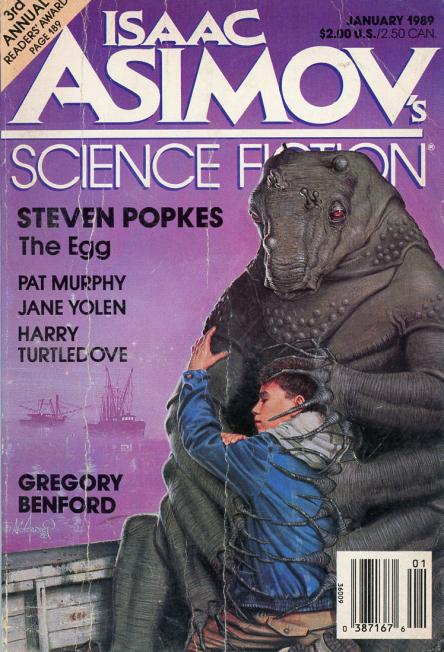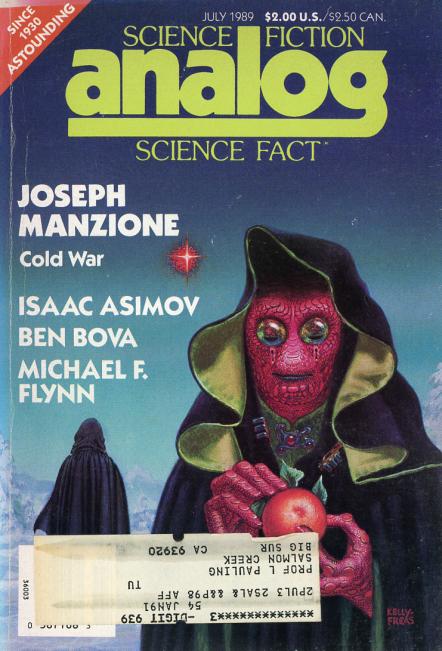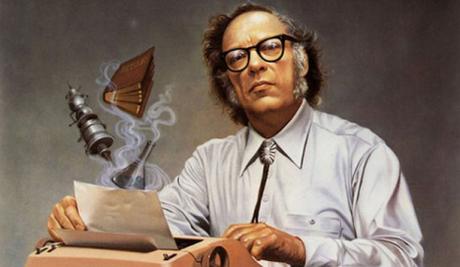
[Part 2 of 2]
By the late 1980s, Linus Pauling had expanded his editorial quest with his old friend Isaac Asimov. No longer content to just correct more current publications, Pauling was now dredging up Asimov’s old errors. In this, one is able to intuit a certain playfulness on Pauling’s part, as if correcting these past inaccuracies served mainly as fodder for continuing the banter between two long-time acquaintances.
Specifically, in 1989 Pauling wrote to Asimov about a 1982 article that he had published in Fantasy and Science Fiction. Erroneously, but perhaps seeking to needle his correspondent a bit, Pauling opened this particular note by saying that
The mistake that I’m writing to you about today is, I think, only the second one that I have noticed in your writings. Perhaps it gives me some pleasure to think that you are not infallible.
In the piece under retrospective review, Asimov had claimed that a double bond was weaker than a single bond, which Pauling assured him was all wrong. One of the world’s foremost authorities on the subject, Pauling conveyed to Asimov that, by various criteria, a double bond is found to be about twice as strong as a single bond.
“What you are really thinking about, but not clearly,” he went on, “is that a double bond is sometimes weaker than two single bonds between atoms of the same two kinds.” In his text, Asimov had claimed that a double carbon-oxygen bond was weaker than a carbon-oxygen single bond, but Pauling clarified that what he probably meant was that the double bond energy of carbon-oxygen in some molecular structures might be a little less than the energy of two single carbon-oxygen bonds.
One can easily imagine Asimov shaking his head a bit as he penned his response. “Chalk up one more mistake I’ll never make again. Unfortunately, I keep thinking up brand new mistakes.” He then added, perhaps with a tinge of sarcasm, “How fortunate I am to have you as a friend!”
Throughout the remainder of his years, Pauling continued to provide these apparently good natured criticisms, announcing on another occasion that he was “pleased to report” that he had found another place where the great science fiction writer had slipped up.
This time, in yet another recent issue of Fantasy and Science Fiction, Asimov discussed the Doppler effect. In it, he explained that sound waves are closer together when emanating from an approaching train than they would be if the train had been standing still and, as such, that the wave length upon approach is thus longer and the pitch lower. Pauling pointed out that, in fact, the opposite was true: the wave length was shorter and the pitch higher as the train was approaching.
In his retort, Asimov excused this particular error on the grounds that, “the damned typesetter left out a line or two.”
“I don’t mind making a mistake and being corrected,” he continued, “but it does bother one to have someone else make the mistake and make you look like a fool – but it happens to all of us.”

As 1990 rolled around and Linus Pauling stepped down as director of the Linus Pauling Institute of Science and Medicine, he perhaps had a bit more spare time on his hands; time which he could dedicate to writing more helpful letters to his pen pal Isaac Asimov!
By now Pauling was reciting inaccuracies from memory, in one instance having apparently lost the article under consideration and unable to clearly recall what it was even about (“I think, cold fusion…” Pauling mused, though remaining unsure). On less stable footing that usual, Pauling offered an editorial olive branch of sorts, praising Asimov for so “rarely” making mistakes before nonetheless correcting yet another error, this one having to do with dideuterium molecules and their protons and electrons.
In case that wasn’t enough, Pauling’s concern for Asimov’s writing soon went beyond its scientific content. In a 1991 letter, Pauling criticized Asimov’s usage of the word “escapees” in a recent article. Pauling defended his stance with an appeal to the adjudicators of such things: “I join with authorities on the English language,” he argued, “Fowler’s Modern Usage, Second Edition, 1965 says ‘Escapee is a superfluous word that should not be allowed to usurp the place of escaper. One might as well call deserters ‘desertees.'”

Though on the surface it may not always have appeared to be so, a strong bond of mutual respect was nestled within what sometimes came across as a rather pedantic relationship between one of the great scientists and one of the great science fiction writers in human history. Delighted as he was to spot an error, Pauling confessed to Asimov that, for years, he had admired his very broad knowledge of science and his ability to present it in an accessible and exciting way to a general group of readers. He likewise added that he greatly appreciated Asimov’s excellent use of English, stray use of “escapee” not withstanding.
After Asimov passed away in April 1992, Pauling sent a heartfelt letter to his widow, Janet Jeppson Asimov. “I am sure you know that I was very fond of Isaac,” he told her. “I read his articles with much pleasure and some profit (he occasionally presented facts that were new to me). From time to time, too, I had the pleasure of corresponding with him.”
Indeed, Pauling respected Asimov not only as an author and a purveyor of general scientific knowledge to the public, but also as an advocate for social change. Isaac Asimov had been president of the American Humanist Association from 1985 until his death, and in that time the organization operated throughout the United States and internationally as an agnostic ministry and educational outreach organization that hoped to teach others to do good and to preserve peace and prosperity for humanity regardless of religious creed. With such a list of accomplishments to his name, it is easy to see why Pauling gravitated to Asimov. As Pauling said in his final letter to Janet Jeppson Asimov, “He was a truly remarkable person.”
